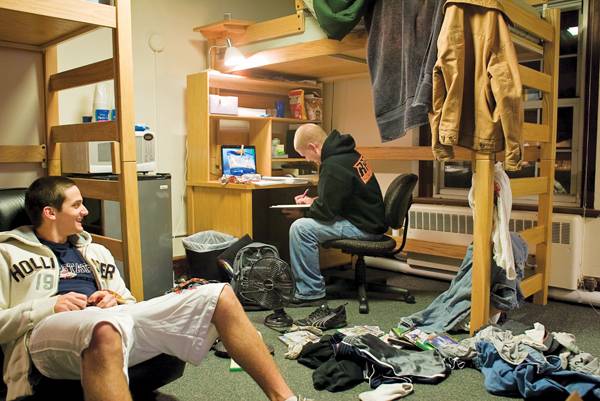A clean room and household improves health

Photo Illustration: Benjamin Brabant/Iowa State Daily
December 4, 2008
Dirty residence hall rooms and apartments are standard for many college students, but beneath the surface — even of the most outwardly clean rooms — lurk hidden health dangers.
Students can easily fall victim to these dangers and not realize their living spaces are making them sick.
Steve Waters, owner of Pro Cleaning Experts, 56780 241st St., said cleaning is “a necessary thing people need to do.”
The main cleaning item to have, Waters said, is a vacuum — because it eliminates dust, which can be bothersome to anyone, but especially to individuals with allergies.
Dust mites, although invisible to the naked eye, pose other concerns. Dr. Philip Tierno, author of “The Secret Life of Germs,” said in an interview with Oprah Magazine that mites cause many different problems, and yet are easy to get rid of.
“They live off the skin cells you slough off,” Tierno said in the interview.
Side effects of dust mites include allergenic issues and respiratory problems. The recommended course of action to remove mites from living spaces is to vacuum often, especially fabrics. Textiles, like bed linens, also harbor mites — experts recommend they be washed weekly to avoid mite development and build-up.
Because the air is drier during the winter months, Waters said, vaporizers and misters are helpful to use because they put moisture back in the air.
However, too much moisture can also be problematic. Anywhere moisture exists, there is a greater risk of bacteria, mold and fungi growing. In confined spaces, such as dorm rooms, extra caution should be taken to make sure objects such as towels dry thoroughly.
Instead of throwing damp towels on the floor a shower, students should hang them up to dry, which will prevent mold.
“Mold will generate when there’s high levels of humidity,” Waters said. “Don’t leave damp towels on the floor — to prevent mold.”
According to www.education.com, moisture spots can lead to the growth of mold and microscopic fungi, which can result in symptoms such as fatigue, bloody noses and problems breathing.
Morgan Mock, senior in history, suffers from allergies and understands the impact moisture can have.
“The flood added a lot of mold to the basement,” Mock said. “They removed it, but it could have affected me it if wasn’t.”
Other steps to take include buying a de-humidifier and wrapping mattresses and bedding in covers designed to reduce allergens.
As an allergy sufferer, Mock said it’s important for her to wash her sheets and pillows often.
“I wash my pillow case every week and I have an allergy cover underneath my pillowcase,” Mock said.
Those with allergies should be especially aware of their surroundings. Humidifiers, water-damaged objects and leaks are all potential breeding grounds for mold and mildew growth.
Carpet and living space “is dirty and will take its toll [if you don’t clean],” Waters said, — possibly troublesome side affects can appear if you’re sensitive to dust.
“Carpet will hold more [dust] than you imagine,” Waters said.
Of carpet, Waters said, “it needs to be clean and it’s not different from clothes.”
Also keep tile floors clean, Waters said, by mopping with a good soap.
Natalie Andrews, sophomore in management, has found her living style differs from those she lives with.
“There are flies that swarm around the room,” Andrews said. “I find it hard to concentrate so I have to go somewhere else.”
Andrews’ situation is not uncommon, but with a few small changes in cleaning routines, battling the winter weather and staying healthy can be easier than she thinks.






